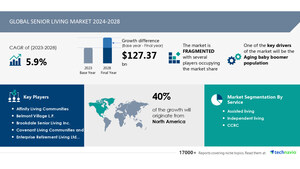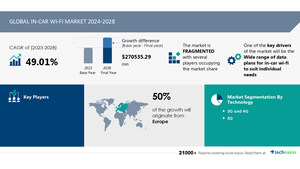NEW YORK, Aug. 15, 2024 /PRNewswire/ -- The global social commerce market size is estimated to grow by USD 8.88 trillion from 2024-2028, according to Technavio. The market is estimated to grow at a CAGR of almost 41.53% during the forecast period. Personalized shopping experience and diverse product portfolios on social commerce platforms is driving market growth, with a trend towards technological advances in social media. However, efforts required for customer engagement and retention poses a challenge. Key market players include Advance, Alibaba Group Holding Ltd., Automattic Inc., ByteDance Ltd., Charlton Media Group, Etsy Inc., Eventbrite Inc., Fashnear Technologies Pvt. Ltd., iQIYI Inc., Meta Platforms Inc., Microsoft Corp., One97 Communications Ltd., PayPal Holdings Inc., PDD Holdings, Renren Inc., Shopify Inc., SINA Corp., Tencent Holdings Ltd., Twitter Inc., and Verizon Communications Inc..
Get a detailed analysis on regions, market segments, customer landscape, and companies - Click for the snapshot of this report
Forecast period |
2024-2028 |
Base Year |
2023 |
Historic Data |
2018 - 2022 |
Segment Covered |
Device (Laptops and PCs, Mobiles, Tablets, and Others), Business Segment (Business to consumer, Business to business, and Consumer to consumer), and Geography (APAC, North America, Europe, South America, and Middle East and Africa) |
Region Covered |
APAC, North America, Europe, South America, and Middle East and Africa |
Key companies profiled |
Advance, Alibaba Group Holding Ltd., Automattic Inc., ByteDance Ltd., Charlton Media Group, Etsy Inc., Eventbrite Inc., Fashnear Technologies Pvt. Ltd., iQIYI Inc., Meta Platforms Inc., Microsoft Corp., One97 Communications Ltd., PayPal Holdings Inc., PDD Holdings, Renren Inc., Shopify Inc., SINA Corp., Tencent Holdings Ltd., Twitter Inc., and Verizon Communications Inc. |
Key Market Trends Fueling Growth
Social media platforms have evolved from simple interaction tools to dynamic marketplaces, with innovations like chatbots driving the global social commerce market. Snapchat, for instance, is a user-friendly social media platform that facilitates shopping and information sharing. Chatbots, which use artificial intelligence for conversational interactions, engage audiences in self-initiated tasks, making marketing more effective and efficient. These technological advancements will continue to shape the social commerce landscape during the forecast period.
Social Commerce is a trending business strategy that combines social media and e-commerce. It's all about making the shopping process more engaging and convenient for customers. One key trend is the importance of secure payment methods and user data protection. Changing consumer preferences prioritize user experience, and user-generated content and product recommendations are becoming essential. Social influence also plays a significant role, with brands and sellers leveraging social media platforms for brand awareness and customer engagement. Multichannel retailing is another trend, with businesses using the latest technology like artificial intelligence and augmented reality to enhance product discovery and checkout. Consumer behavior and preferences continue to shape this market, with millennials leading the way in content shopping, sharing, and messaging features. Small businesses are also jumping on board to increase conversion rates and reach new customers in virtual environments.
Discover 360° analysis of this market. For complete information, schedule your consultation- Book Here!
Market Challenges
- In the social commerce market, customer engagement is a significant challenge for vendors. Unlike traditional retail stores where sales associates assist customers in making purchases and influence buying decisions, social commerce platforms give consumers full control over their purchases. If a vendor's webpage or mobile application fails to captivate and engage customers, they may explore other shopping sites or visit physical stores, limiting growth opportunities for the vendor during the forecast period. Therefore, creating an appealing and interactive online shopping experience is crucial for retaining customers and driving sales in the social commerce industry.
- Social Commerce Market: A New Frontier for Businesses The Social Commerce market is revolutionizing the way businesses connect with customers. In this virtual environment, shopping is no longer a solitary activity. Instead, it's a social experience. Customers discover products through content shopping on social media platforms. Interested buyers engage with brands and sellers, share their finds, and make purchases directly. Messaging features facilitate immediate communication, providing excellent customer service. Millennials and younger generations are driving this trend. Brands and small businesses, as well as individuals, are leveraging social media to increase brand awareness. Consumer preference for personalized shopping experiences is met through mobile technology and modern technologies like Video Commerce and livestream shopping. However, challenges persist. Security concerns, regulatory compliance, privacy issues, and cyberattacks are major concerns. Brands must collect data responsibly and ensure information exchange is secure. Marketing tools like influencer collaborations, shoppable posts, and personalized customer interactions are essential to stand out in this competitive landscape. In the Social Commerce market, the internet-savvy population is the new consumer base. Large players and smaller niche providers must adapt to this modern shopping experience to stay relevant.
For more insights on driver and challenges - Download a Sample Report
Segment Overview
This social commerce market report extensively covers market segmentation by
- Device
- 1.1 Laptops and PCs
- 1.2 Mobiles
- 1.3 Tablets
- 1.4 Others
- Business Segment
- 2.1 Business to consumer
- 2.2 Business to business
- 2.3 Consumer to consumer
- Geography
- 3.1 APAC
- 3.2 North America
- 3.3 Europe
- 3.4 South America
- 3.5 Middle East and Africa
1.1 Laptops and PCs- The social commerce market is a significant business sector where companies sell products directly to consumers through social media platforms. Brands engage with customers by sharing product information, promotions, and user-generated content. This approach offers convenience, personalization, and real-time interaction, leading to increased sales and customer loyalty. Social media's vast user base allows businesses to reach a broader audience and target specific demographics effectively. By leveraging social media's unique features, companies can build strong online communities and foster long-term relationships with their customers.
For more information on market segmentation with geographical analysis including forecast (2024-2028) and historic data (2018 - 2022) - Download a Sample Report
Learn and explore more about Technavio's in-depth research reports
The global e-commerce market continues its robust growth, driven by technological advancements and increasing consumer preference for online shopping. Southeast Asia's e-commerce logistics market is also on an upward trajectory, fueled by rising internet penetration and digital payments. These trends underscore the growing significance of digital retail and logistics across key regions.
Research Analysis
The Social Commerce Market is revolutionizing the shopping experience by merging virtual environments with the customers' favorite social media platforms. In this innovative shopping process, product discovery happens through content shopping and interested buyers can engage directly with brands and sellers. Social media platforms have transformed into marketplaces, allowing users to make purchases without leaving the app. Messaging features facilitate seamless communication between buyers and sellers. Millennials, small businesses, individuals, and even large players are leveraging modern technologies to reach an internet-savvy population. Brands and sellers increase brand awareness through influencer collaborations and shoppable posts. Consumer purchase behavior is influenced by personalized shopping recommendations and changing preferences. Electronics, home decor, and various niche products can be discovered and purchased in these virtual marketplaces. However, privacy concerns and regulatory compliance are crucial considerations for both buyers and sellers. Secure payment methods and user data protection are essential to ensure a safe shopping experience. User-generated content and product recommendations contribute to the overall user experience. The market caters to both large players and smaller niche providers, offering a diverse range of products and services. As the market continues to evolve, it's essential to adapt to the latest consumer preferences and technologies to stay competitive.
Market Research Overview
The Social Commerce Market is revolutionizing the shopping experience by merging virtual environments and social media platforms. Customers can discover products through content shopping and sharing, leading to interested buyers engaging with brands and sellers. The shopping process is streamlined with checkout features, messaging, and secure payments. Millennials and younger generations are driving this trend, seeking immediate communication and personalized customer experiences. Modern technologies like Video Commerce, livestream shopping, and shoppable posts are transforming consumer purchase behavior in sectors like personal and beauty, electronics, home decor, and more. Brands and small businesses benefit from increased brand awareness and consumer preference. However, concerns around cyberattacks, data collection, privacy, and regulatory compliance persist. Businesses must adopt secure payment methods, user data protection, and changing consumer preferences to ensure a positive buyer experience. Marketing tools like personalized shopping, social influence, and user-generated content are essential for engagement and conversion rates. The future of retail lies in multichannel retailing, leveraging the latest technology, artificial intelligence, and augmented reality to enhance consumer experiences.
Table of Contents:
1 Executive Summary
2 Market Landscape
3 Market Sizing
4 Historic Market Size
5 Five Forces Analysis
6 Market Segmentation
- Device
- Laptops And PCs
- Mobiles
- Tablets
- Others
- Business Segment
- Business To Consumer
- Business To Business
- Consumer To Consumer
- Geography
- APAC
- North America
- Europe
- South America
- Middle East And Africa
7 Customer Landscape
8 Geographic Landscape
9 Drivers, Challenges, and Trends
10 Company Landscape
11 Company Analysis
12 Appendix
About Technavio
Technavio is a leading global technology research and advisory company. Their research and analysis focuses on emerging market trends and provides actionable insights to help businesses identify market opportunities and develop effective strategies to optimize their market positions.
With over 500 specialized analysts, Technavio's report library consists of more than 17,000 reports and counting, covering 800 technologies, spanning across 50 countries. Their client base consists of enterprises of all sizes, including more than 100 Fortune 500 companies. This growing client base relies on Technavio's comprehensive coverage, extensive research, and actionable market insights to identify opportunities in existing and potential markets and assess their competitive positions within changing market scenarios.
Contacts
Technavio Research
Jesse Maida
Media & Marketing Executive
US: +1 844 364 1100
UK: +44 203 893 3200
Email: [email protected]
Website: www.technavio.com/
SOURCE Technavio

WANT YOUR COMPANY'S NEWS FEATURED ON PRNEWSWIRE.COM?
Newsrooms &
Influencers
Digital Media
Outlets
Journalists
Opted In





Share this article